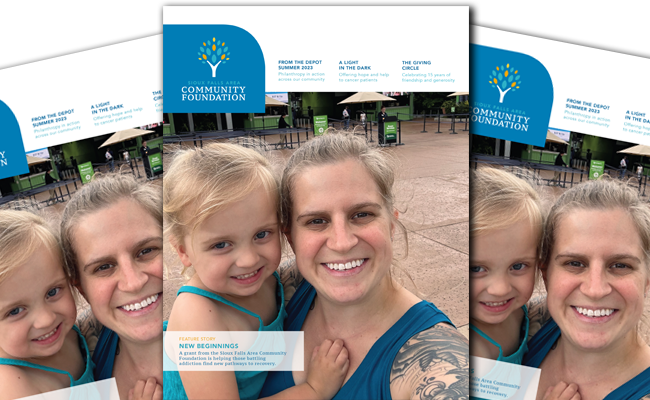Latest News
Guiding the Road to Recovery
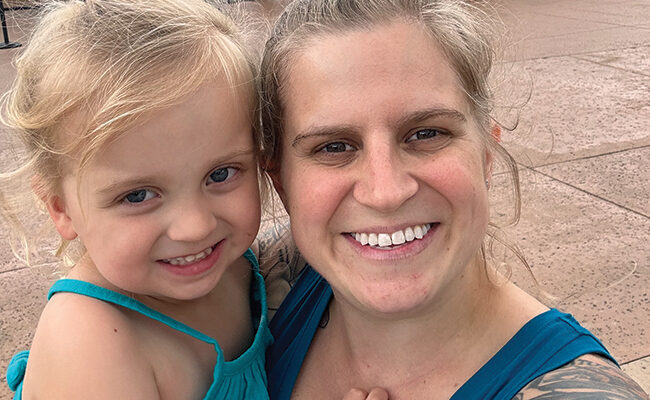
Kaitlin Schriever lost more than a decade of her life to addiction.
Her story of substance abuse is long and winding and deeply painful. As a teen, she used alcohol and marijuana to mask feelings of loneliness and insecurity. After high school, she used opioids and eventually meth to escape the pain of an unhealthy relationship. At one point, her dependence on meth was all-consuming. She did whatever she could to get high — stealing from family and friends, stealing from stores, and lying to literally everyone she knew.
At her lowest point, she was alone, homeless and living in her car.
She was, she said, completely broken.
Her downward spiral eventually ended with an arrest. But rather than going to prison, Schriever was given a chance to travel a new road — the road to recovery.
Her journey began at Drug Court, a program of the South Dakota Unified Judicial System that offers those who’ve committed more than one nonviolent drug-related crime access to counseling, treatment and support to achieve sobriety.
Drug Court’s goal is not only to help participants overcome addiction, but to help them return to society as sober and productive members of their communities.
Through Drug Court, Schriever found a way forward. It certainly wasn’t easy, and there were stumbles and falls along the way, but thanks to a supportive network, she made it through. Today, she is celebrating more than seven years of sobriety.
Since graduating from Drug Court in 2016, she has built a healthy life for herself. She has a good job and is advancing in her career. She and her husband own a home. They are parents to a young daughter and are expecting their second baby in October.
While Schriever is winning in the battle against addiction, others, sadly, are not. For many across our community, the complexities of the last few years, coupled with today’s surging demand for mental health professionals, have made the idea of recovery seem almost out of reach.
A recent grant from the Community Foundation aims to change that.
The grant will support a new effort designed to create a network of peer support specialists who can help Drug Court participants navigate the path to recovery. Graduates of Drug Court who wish to become certified peer support specialists can enroll in a training program to learn how to use their lived experiences to help others who are battling addiction.
Advocates say a strong peer support network will be a game-changer in the fight against substance abuse.
“Research is showing us that this is how we provide wrap-around care for Drug Court participants,” said Dez Kincaid, coordinator for the Second Judicial Circuit Drug Court. “Peer support specialists can help bring others out of misery through their own lived experiences by affirming a clinician’s guidance, by reinforcing recovery recommendations and strategies, and by modeling behaviors as a peer. That modeling is so important in the way we learn and the way we process things.”
“This will move Drug Court participants forward in their treatment and in their recovery much faster, and more successfully, and it will ensure they have a sense of community around them so they don’t feel so lost,” Kincaid said. “That’s a major factor of relapse. We can get people sober, but staying sober without a community around you is really difficult.”
The power of saying ‘I’ve been in your shoes’
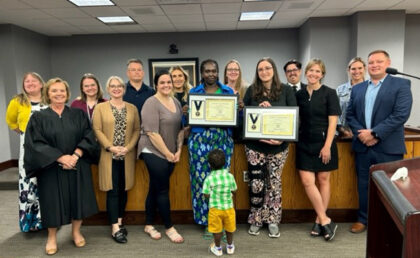
Retired Circuit Court Judge Patricia Riepel presides over Drug Court and has seen the value of peer support specialists first-hand.
“For someone who’s struggling with substance use, homelessness, joblessness, family issues or other trauma — to have someone who’s gone through a similar issue say, ‘Hey, I know where you’ve been, and you can do this,’ — I think that offers a different type of hope and a sense of belief in someone’s ability to succeed,” Riepel said.
Dr. Melissa “Mo” Dittberner, a professor in the Addiction Counseling and Prevention Department at the University of South Dakota, agrees.
Dittberner developed the curriculum for the peer support specialist training in collaboration with
Diane Eide, a project manager for the South Dakota Foundation for Medical Care.
“Peer specialists are not a new concept. Think about cancer patients who rely on care navigators — individuals who have been through their own cancer journeys. Peer specialists are really an evidence-based answer to the question of how best to support people on their path to recovery,” Dittberner said. “We know that people in recovery are experts in the recovery process. There’s real value in being able to turn to someone who’s ‘been there, done that.’ There’s a lot of evidence that shows the practice helps people.”
The peer support specialist training will begin in September as a pilot program.
“We’d love to be able to roll this out across South Dakota to the various drug courts that exist statewide,” Dittberner said. “This is really just a springboard to help us implement what we know works, for the benefit of so many people across the state who need help.”
Opportunities and possibilities beyond recovery
The peer support specialist model has the potential to impact more than just those working toward recovery, Dittberner said. Serving as a peer support specialist provides a source of income and can also inspire a pathway to a new career.
“If you’ve gone through Drug Court, your ability to work has been impacted. If you have a felony on your record, it’s hard to get back into the workforce. We love the idea that, thanks to this grant, we can train people and offer potential employment opportunities,” she said. “A lot of people in recovery express interest in becoming a drug and alcohol counselor, which I think is fabulous. So this training will be a really great first step for them to see what it looks like to help others who have been in their shoes.”
Addiction impacts our entire community. That’s why we believe recovery should be a community effort. We’re proud of this grant and we believe in the impact it will have.
— Patrick Gale, Vice President, Community Investment
A community of care
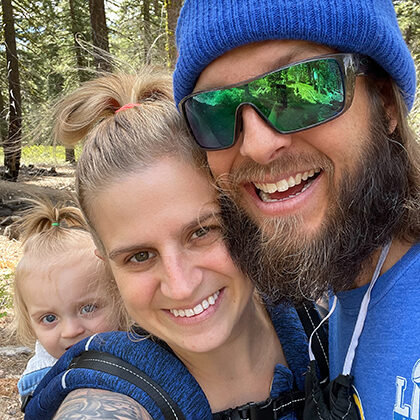
Reflecting on her journey to recovery, Schriever said she wouldn’t be where she is today without Drug Court.
“I feel like the people I met though that program really helped me succeed on my road to recovery,” she said. “When you’re just starting out on the path to sobriety, it feels like there are so many roadblocks. Most of them are in your head — feeling like you’re not good enough, feelings of shame. It’s overwhelming.”
“My probation officer and my counselor were both amazing. They went above and beyond to help me. My probation officer helped me get a job. I started meeting people who had never done drugs before and I began to see the things they were able to do in life — buying a car, buying a home, going on vacation. I began to want those things for myself. I had some great mentors — people in my life who were in recovery, and people who had lived a completely different story than mine — and it meant so much to have all those people fighting for me. They believed in recovery and they helped me build my own foundation for the future,” she said.
Today, Shriever is paying that help and kindness forward by sharing her time and experience as a Drug Court peer support specialist. Each week, she meets with new Drug Court participants to offer support and mentorship as they begin their road to recovery.
“I tell them I’ve been in their shoes and that I’m there for them. I give them my contact information and tell them to reach out when they’re ready,” she said.
Her willingness to share her own story serves as an inspiration for others who are just beginning their journey to recovery, Kincaid said.
“These folks have been sequestered from the community for so long — sometimes at their own choice, sometimes because of consequences from their own situations. There’s a great deal of shame and embarrassment and a feeling of not belonging,” she said. “But, thanks to this grant, they’ll soon be able to watch someone and talk with someone who’s been in their seat — it’s building that community for them and showing them, from people who’ve walked this path and succeeded, that they have a place in our community. It’s the wrap-around support we’ve always wanted so we’re really thankful for this opportunity.”
Patrick Gale serves as the Foundation’s vice president for community investment. He called the peer support specialist training program a major step forward for all those battling addiction.
“We know the road to recovery is painful and difficult. And we know that the more positive support we can offer throughout that journey, the more successful people will be,” Gale said.
“We’re extremely proud to support this effort, which we know will help not only those who are working toward sobriety, but their families, friends, and neighbors as well,” he said.
Related Posts
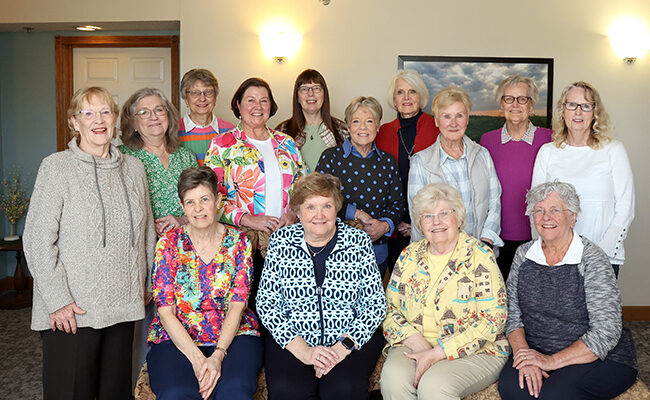
Full Circle
It began as a group of women united in fellowship and philanthropy. It ended 15 years later as a testament to the power of friendship, compassion and generosity. The Giving Circle is an inspiration to us all.
Read More
